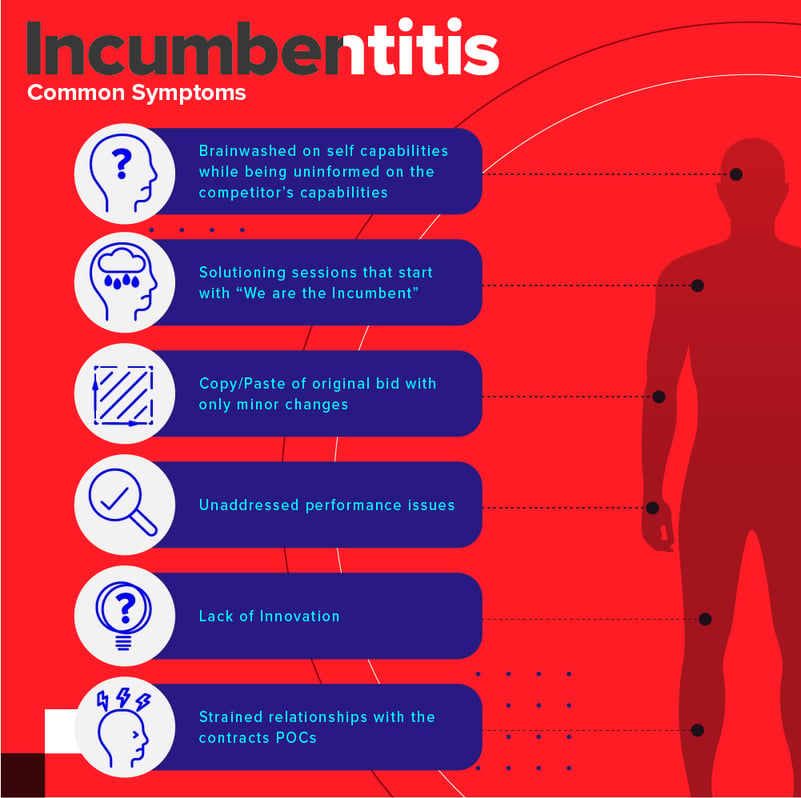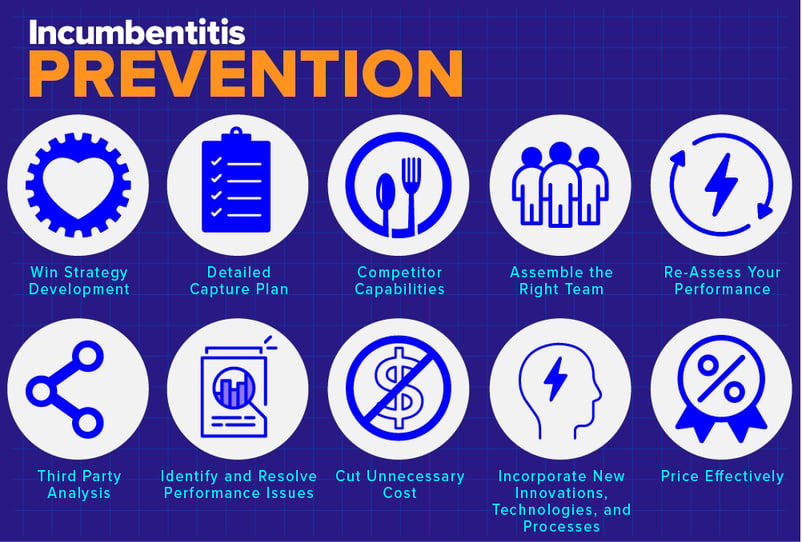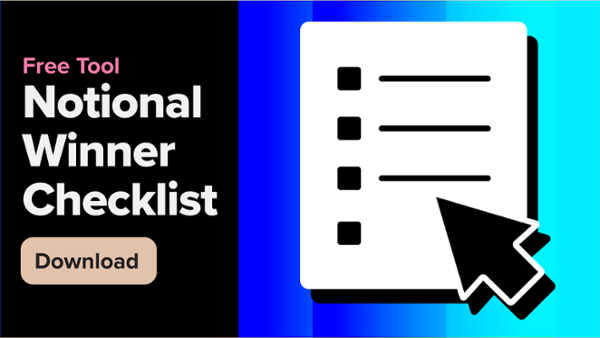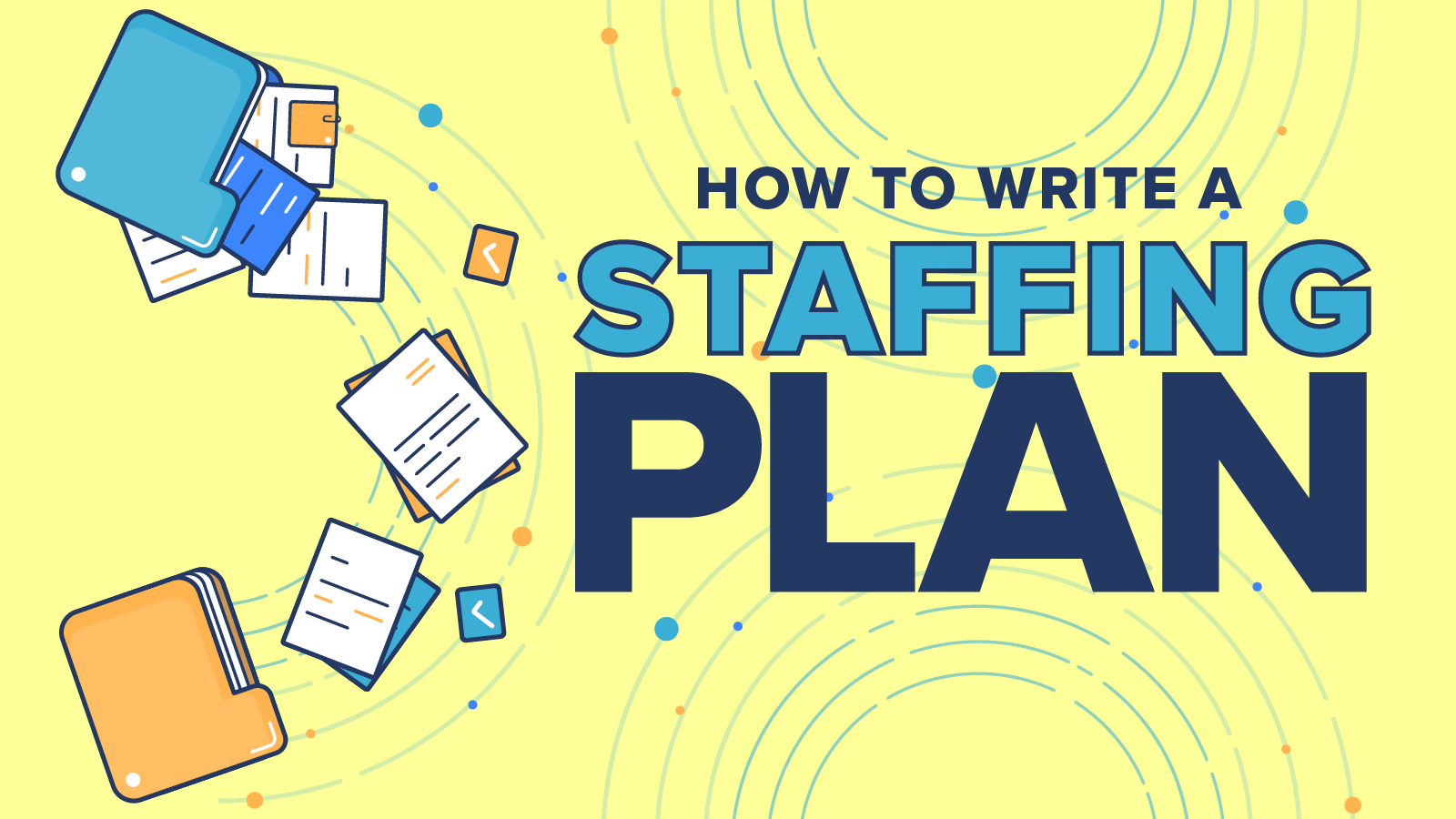
Many of you may have heard of the common proposal affliction, incumbentitis.
This illness can come in phases and affect different aspects of your bid during the re-compete process. In this article, we will discuss some symptoms of this condition, how to diagnose the problem (self-evaluation), and possible cures for most of these symptoms. Put on a mask as we go on a trip to the incumbentitis ward.
What is Incumbentitis?
Incumbentitis refers to those incumbent companies that fail to perform the due diligence required to win a re-compete bid. This lack of due diligence can include poor capture planning, inadequate proposal response, overlooking deficiencies and performance issues, meeting criticism with hostility, and something we see far too frequently, companies assuming they will win a follow-on contract simply because they are the incumbent.
All proposal responses are subject to a fair evaluation regardless of whether the proposal being evaluated is from the incumbent or another contractor. The Government will award the contract to the contractor that submits a compelling and comprehensive response that is in the Government’s best interests.

By performing a simple self-evaluation, you can identify whether your company suffers from incumbentitis. If you can answer yes to any of the symptoms outlined below, you may suffer from this affliction.
- We are the incumbent. We know the work and price. We will win.
- Lack of process during the proposal development.
- Not enough preparation before the Request for Proposal (RFP) release.
- Copy/Paste content submitted for the original bid.
- Lack of win themes and storyboard development.
- Lack of integration of key Subject Matter Experts (SMEs) into the capture and proposal team.
- Lack of understanding of project requirements.
- Infrequent communication between the incumbent and the contract Point of Contact (POC).
- Inconsistencies in performance or relationship with the Government.
- Multiple Continuing Resolutions (CR)/Deficiency Reports (DRs) or terrible Contractor Performance Assessment Report (CPAR) ratings
- Lack of innovation or stagnation.
- Lack of self-evaluation, due diligence on competition, innovation, landscape/market, politics, budgets, emerging technologies, and a whole host of other factors that may go into the development and submission of the recompete contract.
How to Proactively Prevent Incumbentitis
The best way to combat incumbentitis is to start your capture and proposal activities early. These solutions or activities to prevent incumbentitis include:- Create a Notional Winner Profile as part of the win strategy development.
- Maintain a positive presence with the government. Interact and build a professional relationship with the POCs.
- Create a detailed capture plan that outlines specific details of the contract including win themes and storyboards.
- Assemble a team that has a mix of contract SMEs and internal staff to facilitate the development of the proposal.
- Take the temperature of the boots on the ground. Talk to staff and Government personnel. Show presence. For large strategic bids, consider a third-party assessment.
- Third Party Assessment – A third party performs an unbiased assessment of the contractor’s history and performance of the contract requirements. KSI works with the Government to help identify deficiencies, performance issues, etc.
- Learn about your competition and what they bring to the table. Use things you know about the contract to ghost the competition.
- Find/hire a subcontractor, vendor, or distributor who can assist in meeting certain requirements.
- Price your proposals more effectively. Sometimes incorporating certain positions into overhead costs to save the government money can be the difference between an award on a Low Price Technically Acceptable (LPTA) bid.

How to “Cure” Incumbentitis in Your Existing Proposal
You may ask yourself what to do if you have a live RFP and haven’t taken the necessary steps to prevent this affliction. Not to worry. There are some steps you can take to cure incumbentitis in your existing proposal:
- Examine how the requirements have changed over time. Develop a proposal response based on the new L and M requirements.
- Reassess how the work has been done in the past and apply innovation and efficiencies to the recompete bid.
- Incorporate new technologies, techniques, or processes that help your company save time and money while helping meet all performance goals and deliverables.
- Make the proposal about the customer. Talk about their pain points and how you will continue to address those issues.
- Make sure you’re articulating the benefits they receive from your solution.
- Fill your proposal with proof points and metrics; give the Government the necessary data to justify choosing you again.
- You may have to lean out pricing to stay in the running for an award.
- Retain select incumbent employees—this is the easiest way to fill an extended number of seats but is also the easiest way to carry over underperforming employees to the follow-on contract.
- Double-vet all existing employees before extending an invitation to continue working on the follow-on contract.
- When your contract is up for recompete again, aim for prevention rather than the cure.
Conclusion
If your company is the incumbent on a recompete contract, it may appear that you have a guaranteed win. However, failing to consider certain indicators of incumbentitis could result in losing the contract. Fight the symptoms one by one by creating a solid capture plan, developing a win strategy, submitting a well-written proposal, pricing effectively, and incorporating innovations and new technologies. Above all stay humble.








